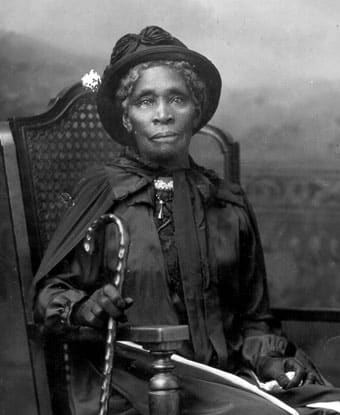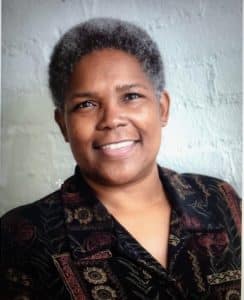17 Mar Women’s History Month: Matilda Murphy Dunbar

Dunbar, photo from Ohio History Connection.
In honor of Women’s History Month, the Shelby County Public Library will highlight notable Kentucky women throughout the month of March. Earlier this month, we discussed Julia A. Tevis, the founder of Science Hill School. Today, we are highlighting Matilda Murphy Dunbar.
Matilda Murphy Dunbar (1845-1934)
Written by Sanda Jones. Reposted with the author’s permission.
Born a slave in Shelby County, Dunbar was the mother of famous black poet Paul Laurence Dunbar. As a slave girl, Matilda grew up listening to her master (David Glass) read poetry. She wanted to learn to read. However, slaves were not taught to read or write as it was forbidden.
Matilda was offered her freedom in 1865. She moved to Dayton, Ohio to live with her mother. She married Joshua Dunbar in 1871 and they had 2 children, Paul and Elizabeth. Elizabeth died on her third birthday. Matilda’s desire was to teach her children to read, so she began to take night classes and she was able to teach her son Paul how to read.
Paul Laurence Dunbar went on to become an internationally-known poet and became known throughout history in American Literature. According to Poetry Foundation, “[Dunbar] became one of the first influential Black poets in American literature and was internationally acclaimed for his dialectic verse in collections such as Majors and Minors (1895) and Lyrics of Lowly Life (1896).” (Poetry Foundation)
Paul died of tuberculosis in 1906. Paul Laurence Dunbar High School in Lexington, KY is named after him. Matilda continued Paul’s legacy by maintaining his library and study as he left it. Matilda Murphy Dunbar died in February 1934. The Ohio State Archaeological and Historical Society (today the Ohio Historical Society) acquired the house after her death and formally opened it as a museum in 1938; the Paul Laurence Dunbar State Memorial became part of Dayton Aviation Heritage National Historical Park in 1992.
 Sanda grew up in Shelbyville, Kentucky, and acquired a love of history just a few years ago. She became a member of the Shelby County Historical Society and realized she was the only African American member in the organization. A few years later, Jones became President of the Historical Society and held that position for two years. Her passion for local Shelby County Black History grew and she started researching and writing about Shelby County’s Black history. She is a contributing writer for Shelby Life Magazine and the Shelby County Historical Society’s annual magazine. She currently serves on the Leadership Shelby Board and the Shelby County Remembrance Project committee.
Sanda grew up in Shelbyville, Kentucky, and acquired a love of history just a few years ago. She became a member of the Shelby County Historical Society and realized she was the only African American member in the organization. A few years later, Jones became President of the Historical Society and held that position for two years. Her passion for local Shelby County Black History grew and she started researching and writing about Shelby County’s Black history. She is a contributing writer for Shelby Life Magazine and the Shelby County Historical Society’s annual magazine. She currently serves on the Leadership Shelby Board and the Shelby County Remembrance Project committee.


No Comments